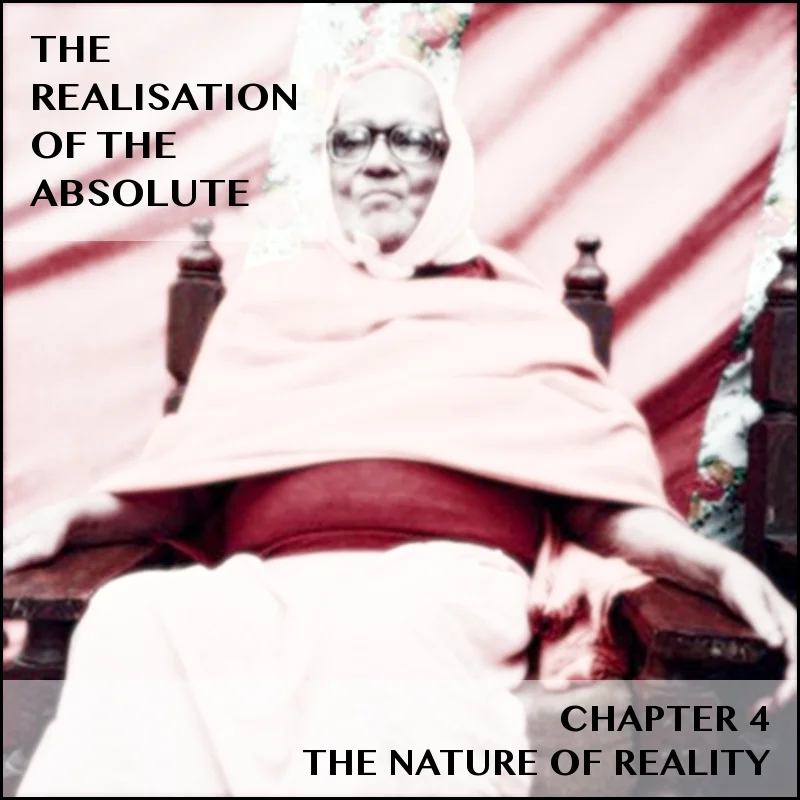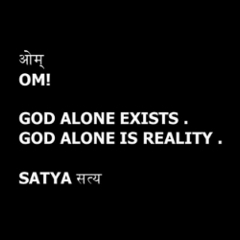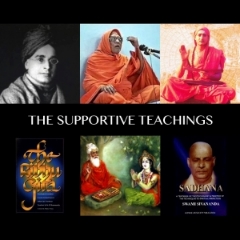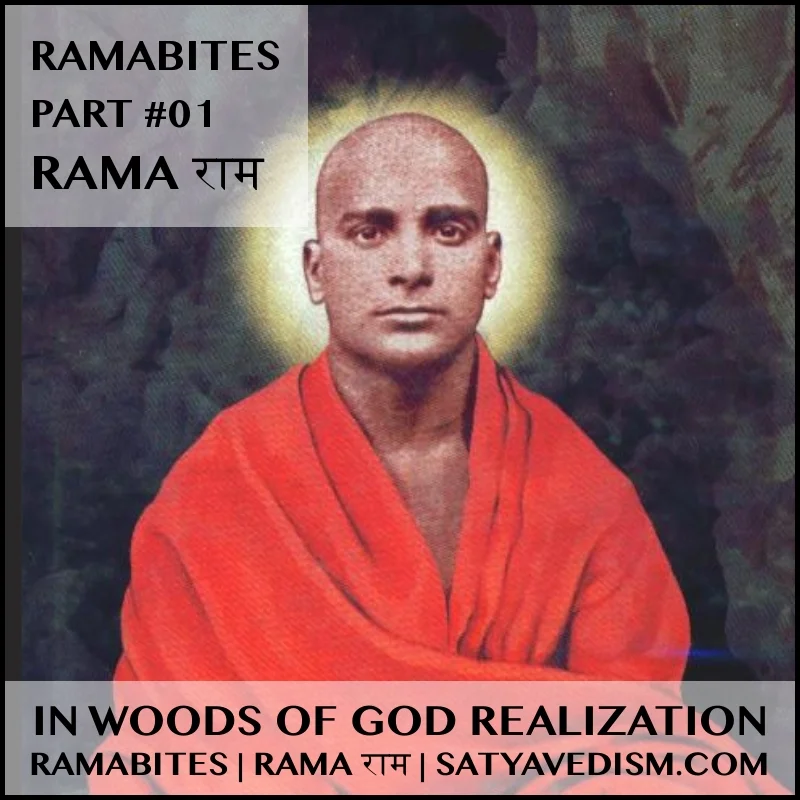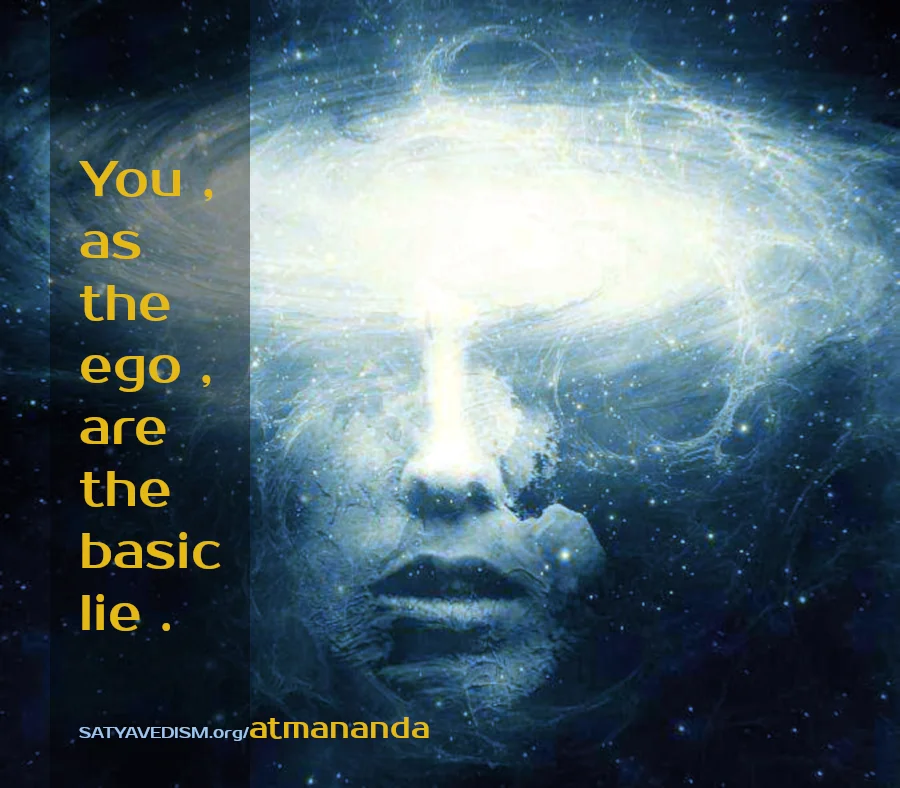TROTA | CHAPTER 4 | SEL0410 TO SEL0431
| | homeTROTA | CHAPTER 4 | SEL0410 | SWAMI KRISHNANANDA
|| 4.03 | BRAHMAN AS BLISS OR HAPPINESS | CONT ||
Further , common experience shows that happiness is a fact of life .
It is the supreme value of life .
There can be no other meaning in life's activities than the attempt at the acquisition of happiness in some way or the other , whatever be the quantity or the quality of the happiness derived .
In fact , happiness has no differences , and , if at all any degree is felt in its experience , it is because of the degrees and differences present in the means made use of for the purpose of obtaining it , and not due to differences existent in happiness itself .
TROTA | CHAPTER 4 | SEL0411 | SWAMI KRISHNANANDA
The light and heat of fire differ due to the differences among the media through which it burns .
Happiness is generally , though not always , experienced in this world as the result of the contact of the mind or the senses with certain pleasant objects or states .
No object or state can , in fact , be pleasant in itself .
If so , the same thing should rouse the same kind of love in every being .
This , however , is not a fact .
TROTA | CHAPTER 4 | SEL0412 | SWAMI KRISHNANANDA
The same thing can stimulate love or hatred in different beings .
One may be a friend of one person and at the same time the enemy of another .
Worms are seen to revel even in pungent and poisonous fruits .
The same object can appear as having different natures even to the same person in different conditions .
The view that anything is pleasant by itself is incorrect .
TROTA | CHAPTER 4 | SEL0413 | SWAMI KRISHNANANDA
Then what is happiness , where is happiness ?
If happiness is commonly experienced through the contact of the subject with the object , and , if happiness cannot be the nature of the object in itself , it must be the nature of either the subject or the process of contact .
The process of contact is not self-existent , but is a mode of thought expressed by the subject of knowledge itself .
Hence , happiness must belong to the subject alone .
But , then , why is contact necessary for rousing the happiness present in the subject ?
TROTA | CHAPTER 4 | SEL0414 | SWAMI KRISHNANANDA
The truth is that when a subject imagines or is looking at an object of love and comes in contact with it , it is really imagining , looking at or experiencing the form taken by the expression of its own want or desire which has pervaded that object of cognition or perception .
It is the desire of the subject that shines and is attractive in the object .
Beauty is in the beholder .
TROTA | CHAPTER 4 | SEL0415 | SWAMI KRISHNANANDA
When the subject contacts the desirable object , it only rejoices over its own desires , identifies itself with these desires , and consequently , for a while , the desires cease to function , they being in union with the subject due to the feeling of satisfaction on account of the notion that the desired object has been possessed .
As there is consciousness already in the subject , it has then a temporary consciousness of the absence of desires , of the identity of the objective process of thought knowing the object , with itself .
When thought rests in the subjective consciousness , the subject is simply conscious of itself , to the exclusion of everything , even the desires .
TROTA | CHAPTER 4 | SEL0416 | SWAMI KRISHNANANDA
But this is a very quick process , a momentary experience of an extremely short duration , because , here , the desires are not destroyed but only withheld .
When an object of desire is enjoyed , there is a lightning-like feeling of independence or freedom from externals , since the pain of the feeling of dependence on the object desired for is removed through obtaining it .
When a person looks at any object , one does not really look at the object , but at the conception or the notion which one has of that object .
TROTA | CHAPTER 4 | SEL0417 | SWAMI KRISHNANANDA
As far as a person is concerned , an object is not truly an object , but a mode which the cognising consciousness has taken in its indivisible nature ; and because this mode is inseparable from the consciousness of the subject , it is best loved , loved as the Self , when the form of the object stands to it as a correct correlative fulfilling its wants , or hated when its form is the opposite .
This is why certain objects appear very dear .
Like a dog that barks at its own reflection seen in a mirror , a person develops a particular attitude towards something in accordance with the idea which one has of that thing .
One cannot think of anything except in terms of one's wishes and notions .
TROTA | CHAPTER 4 | SEL0418 | SWAMI KRISHNANANDA
If there is no desire for something , there can be no happiness derived from that thing .
When desires are withdrawn , objects stand as they are .
But as long as one has even a single desire , it is not possible for one to know what an object is really in itself .
The mind with a desire is like a coloured glass through which we can look at an object as having only that colour and nothing else .
TROTA | CHAPTER 4 | SEL0419 | SWAMI KRISHNANANDA
The happiness experienced by us is , therefore , the experience of the cessation of desire , though it may be temporary .
But contacts with objects only increase pain , as , thereby , the foolish belief that objects bring pleasure is again strengthened , and as each contact creates a further desire to repeat the effort for more such contacts .
TROTA | CHAPTER 4 | SEL0420 | SWAMI KRISHNANANDA
Happiness is the nature of the Self without desires , and every desire increases pain by a degree of intensity equal to , if not more than , that of itself .
Moreover , the love of the Self is the basis of all other loves .
One loves another , because one loves the Self the most .
The ultimate purpose of all loves is to rest in the satisfaction of one's own Self .
TROTA | CHAPTER 4 | SEL0421 | SWAMI KRISHNANANDA
Perception and contact act as agencies in lifting up the veil of subjective desire covering the external objects .
Hence , the motive behind conceptual and perceptual contacts is not so much to obtain anything from the object as such , as to make it an instrument in lifting up the veil in the mind , a purely selfish process which the individual subject tries to get effected thereby .
Conception or perception is , in a way , an effort to exhaust a desire , though , because of the glaring error therein , it may give rise to another desire .
TROTA | CHAPTER 4 | SEL0422 | SWAMI KRISHNANANDA
Contact is , therefore , not a method of acquiring happiness , but a means of getting freed from the pain of desiring , and thus making the Self experience itself indirectly .
But even this temporary experience of happiness due to contact should not be mistaken for even a jot of true Self-Bliss , for in contact the desires are not destroyed , and this happiness experienced through contact is only a reflection of Self-Bliss through the material quality of sattva .
Contact is only a stimulus to sattva-guna , which alone can reflect happiness .
Sense-contact is a crude method of fulfilling desire born of deluded perception , and it can never bring to the experiencer the real bliss which one is hankering after .
TROTA | CHAPTER 4 | SEL0423 | SWAMI KRISHNANANDA
None really loves anything for its own sake , for nothing in the universe has a true objective value that is valid for all times .
All values proceed from the Self , and subsist in the Self .
The Self alone is the ultimate and infinite value in all things .
Careful analysis will reveal that all contacts have their meaning in Self-satisfaction .
Self-satisfaction in its individual signification is only an apparent pleasure and is a delusion caused by the functions of the modes of thought .
TROTA | CHAPTER 4 | SEL0424 | SWAMI KRISHNANANDA
Even mental satisfaction brought about through the avenues of the senses is not the end aimed at through the mind and the senses .
No one is permanently satisfied through an objective process .
The self of the human hungers for eternal satisfaction but it gets a cup of poison which it finds in darkness and then drinks , being deprived of the proper vision with which to behold the true nature of things .
No one would consciously drink poison even when one is hungry .
TROTA | CHAPTER 4 | SEL0425 | SWAMI KRISHNANANDA
It is not the intention of the Self to be satisfied with deceitful mirages , but it suffers on account of lack of knowledge .
It is easily misled by the tantalising appearances of life .
In fact the self loves only the highest Essential Existence , which it wants to realise as one with itself , but it cannot discover this Existence amidst the clamour of the senses , the caprices of the mind , and the colour and the noise of objects of the world .
TROTA | CHAPTER 4 | SEL0426 | SWAMI KRISHNANANDA
The love of the Self is unsurpassed .
Even suicide that is committed only goes to prove the supreme love that is evinced in regard to the Self , for it is due to disgust for some conditions of life , and not on account of hatred for the Self , that such an act is perpetrated .
Suicide is the effect of some tormenting type of objective contact , a corroding attachment to a certain phenomenon , an unfulfilled objective , or an unattained relative end .
Even disgust for one's life is only a dissatisfaction with a particular state of life , an unpleasant experience in life , and not with life itself .
None feels from one's heart that one should absolutely cease to exist .
Everyone wishes to enjoy an eternal life of perennial bliss .
A painful life is detested and a pleasant one is coveted .
TROTA | CHAPTER 4 | SEL0427 | SWAMI KRISHNANANDA
The love of the immortal bliss to be experienced as identical with the Self is unconditioned .
It can have no match .
Even when no objects exist , this Self-love does not suffer any diminution .
TROTA | CHAPTER 4 | SEL0428 | SWAMI KRISHNANANDA
In deep sleep , when no objects are experienced , the happiness of the Self remains the same .
One would reject even the dearest object for the sake of the happiness of deep sleep .
Even a vast rulerdom is nothing when sleep supervenes .
The happiness of deep sleep where there is no contact is greater than the pleasure derived through sense-contact .
TROTA | CHAPTER 4 | SEL0429 | SWAMI KRISHNANANDA
There are occasions when one feels that one is fed up with everything , and gets disgusted even with the dearest of possessions .
The freedom and joy experienced at that time is greater than the semblance of satisfaction felt during attachment to and love for objects .
All this suggests that the centre of happiness is , in the end , the Absolute Self .
TROTA | CHAPTER 4 | SEL0430 | SWAMI KRISHNANANDA
What joy one obtains in ordinary life is only a distorted reflection of Self-Bliss through the mind , and hence it is inconstant and never satisfying .
No doubt , the happiness of deep sleep is not reflected through any psychosis allowing intelligence therein , but it is because of the absence of consciousness in deep sleep that its value is not realised .
The mind , in its unmanifested condition , exists in deep sleep and obstructs the manifestation of bliss illumined by consciousness .
TROTA | CHAPTER 4 | SEL0431 | SWAMI KRISHNANANDA
The annihilation of the stuff of the thinking process , both in its developed and undeveloped stages , is what is necessary for the realisation of Eternal Bliss .
This Bliss is experienced in the Self itself , and not anywhere else .
As the Self is absolute in its nature , the Bliss of the Self , also , is absolute .
Bliss is not an attribute but the very essence of the Self .
The Self is BRAHMAN , and Self-Bliss is BRAHMAN-Bliss .
SOURCE | SATYAVEDISM.ORG

